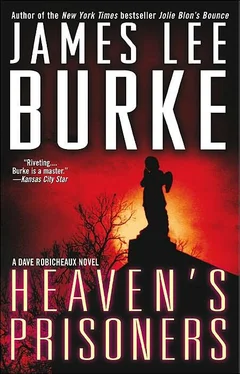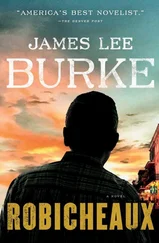
James Lee Burke
Heaven’s Prisoners
The second book in the Robicheaux series
For my agent, Philip Spitzer, a prizefighter who hung in there for the full fifteen, and those wonderful friends down in Louisiana to whom I owe an enormous debt of gratitude: John Easterly, Martha Lacy Hall, and Michael Pinkston
I WAS JUST off Southwest Pass, between Pecan and Marsh islands, with the green, whitecapping water of the Gulf Stream to the south and the long, flat expanse of the Louisiana coastline behind me-which is really not a coastline at all but instead a huge wetlands area of sawgrass, dead cypress strung with wisps of moss, and a maze of canals and bayous that are choked with Japanese water lilies whose purple flowers audibly pop in the morning and whose root systems can wind around your propeller shaft like cable wire. It was May and the breeze was warm and smelled of salt spray and schools of feeding white trout, and high above me pelicans floated on the warm air currents, their extended wings gilded in the sunlight, until suddenly one would drop from the sky like a bomb from its rack, its wings cocked back against its sides, and explode against the water's surface and then rise dripping with a menhaden or a mullet flapping from its pouched beak.
But the sky had been streaked with red at dawn, and I knew that by afternoon thunderheads would roll out of the south, the temperature would suddenly drop twenty degrees, as though all the air had suddenly been sucked out from under an enormous dark bowl, and the blackened sky would tremble with trees of lightning.
I had always loved the Gulf, no matter if it was torn with storms or if the surf was actually frozen with green ridges of ice. Even when I was a police officer in New Orleans, I had lived in a houseboat on Lake Pontchartrain and spent my off-days fishing down in Lafourche Parish and Barataria Bay, and even though I was in homicide I sometimes worked deals through the boys in vice so I could go alone on the Coast Guard cutter when they went after the dope runners out on the salt.
Now I owned a bait and boat-rental business on the bayou south of New Iberia, and twice a week my wife, Annie, and I headed out Southwest Pass in my converted jug boat and trawled for shrimp. It was called a "jug boat" because years ago it had been designed by an oil company for retrieving the long, thick, rubber-coated cables and seismic instruments used in marine oil exploration; it was long, narrow, and flat, with a big Chrysler engine, two screws, and the pilot's cab flush against the stern. Annie and I had outfitted it with ice bins, a bait well, winches for the nets, a small galley, fishing and scuba gear boxes welded to the gunnels, and even a big, canvas Cinzano umbrella that I could open up over a bridge table and folding chairs.
On mornings like this we'd trawl in a big circle through the Pass, the bow almost out of the water with the bursting weight of the net, then we'd load the ice bins full with pink-blue shrimp, set out the rods for gafftop catfish, and fix lunch in the galley while the boat drifted against the anchor rope in the warm wind. On this morning Annie had boiled a pot of shrimp and bluepoint crabs and was cleaning the shrimp in a bowl to mix with a pan of dirty rice we had brought from home. I had to smile as I watched her; she was my Mennonite-Kansas girl, with curly gold hair that lifted on the nape of her neck in the breeze, and eyes that were the most electric blue I had ever seen. She wore a man's faded denim shirt with the tails hanging over her white ducks, and canvas shoes with no socks; she had learned to clean fish and shrimp and handle a boat in a gale as well as if she had been born in the bayou country, but she would always remain my Kansas girl, sewn together from bluebonnets and sunflowers, tilting awkwardly on high heels, always awed by cultural difference and what she called "weirdness" in other people, although she came from a background of wheat-farmer pacifists that was so pervasively eccentric that she couldn't recognise normality when she saw it.
She had a tan even in winter, and the smoothest skin I had ever touched. Small lights played in her eyes when you looked into them. She saw me smiling at her, set down the bowl of shrimp, and walked past me as though she were going to check the rods, then I felt her behind me, felt her breasts touch the back of my head, then her hands collapsed my hair like a tangle of black snakes in my eyes, and her fingers traced my face, my brush mustache, my shoulders, the pungi- stick scar on my stomach that looked like a flattened, gray worm, until her innocent love made me feel that all my years, my love handles, my damaged liver were not important after all. Maybe I had grown foolish, or perhaps fond is a better word, in the way that an aging animal doesn't question its seduction by youth. But her love wasn't a seduction; it was unrelenting and always there, even after a year of marriage, and she gave it eagerly and without condition. She had a strawberry birthmark high up on her right breast, and when she made love her heart filled it with blood until it became a dark red. She moved around the chair, sat on my lap, rubbed her hand across the thin film of sweat on my chest, and touched her curly hair against my cheek. She shifted her weight in my lap, felt me under her, looked knowingly into my eyes, and whispered as though we could be heard, "Let's get the air mattress out of the locker."
"What are you going to do if the Coast Guard plane goes over?"
"Wave."
"What if one of the reels goes out?"
"I'll try to keep your mind on something else."
I looked away from her toward the southern horizon.
"Dave?"
"It's a plane."
"How often do you get propositioned by your own wife? Don't let opportunity pass, skipper." Her blue eyes were merry and full of light.
"No, look. He's in trouble."
It was a bright yellow, two-engine job, and a long trail of thick black smoke blew from behind the cabin all the way across the sky to the horizon. The pilot was trying hard to gain altitude, gunning both engines, but the wingtips wobbled from side to side and wouldn't stabilise and the water was coming up fast. He went past us and I could see faces in the glass windows. The smoke twisted out of a ragged hole just in front of the tail.
"Oh, Dave, I thought I saw a child," Annie said.
The pilot must have been trying to make Pecan Island so he could pancake into the salt grass, but suddenly pieces of the rudder shredded away like strips of wet cardboard and the plane dipped violently to port and turned in a half-circle, both engines stalling now, the smoke curling as thick and black as smoke from an oil fire, and went down hard on one wing against the water's surface, flipped over in the air like a stick toy, and landed upside-down in a huge spray of green and white water and floating seaweed.
The water boiled and danced on the overheated engine housings, and the hole in back actually seemed to create and suck a river deep inside the plane. In seconds the bright yellow underside of the plane was dimming in the low waves that slid across it. I couldn't see the doors, but I kept waiting for somebody in a life preserver to break through the surface. Instead, big balloons of air rose from the cabin, and a dirty slick of oil and gasoline was already obscuring the sun's winking refraction off the wings.
Annie was on the shortwave to the Coast Guard. I pulled the anchor free of the mud, threw it rattling into the bow, turned the big Chrysler engine over, heard the exhausts cough below the waterline, and hit it full throttle for the wreck. The wind and spray were like a cool slap in my face. But all I could see of the plane now were small gold lights in the floating blue-green stain of oil and gas leaking from broken fuel lines.
Читать дальше













